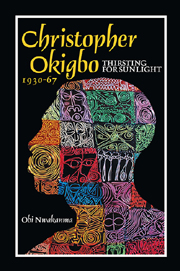Book contents
- Frontmatter
- Contents
- Preface
- Acknowledgements
- Chronology
- Dedication
- Photographs
- Maps
- Okigbo family tree
- 1 A river goddess, his mother's death & a headmaster father
- 2 Sportsman, actor & ‘effortless genius’
- 3 Cricket, classics, politics & urbane dissipation
- 4 Colonial civil servant, covert businessman & bankrupt
- 5 Poetry gives purpose to his voice
- 6 A librarian ravenous for literature & women
- 7 Gentleman, poet & publisher
- 8 Aftermath of a coup, running arms & advancing to death
- Epilogue
- Index
2 - Sportsman, actor & ‘effortless genius’
UMUAHIA 1945–50
Published online by Cambridge University Press: 05 April 2013
- Frontmatter
- Contents
- Preface
- Acknowledgements
- Chronology
- Dedication
- Photographs
- Maps
- Okigbo family tree
- 1 A river goddess, his mother's death & a headmaster father
- 2 Sportsman, actor & ‘effortless genius’
- 3 Cricket, classics, politics & urbane dissipation
- 4 Colonial civil servant, covert businessman & bankrupt
- 5 Poetry gives purpose to his voice
- 6 A librarian ravenous for literature & women
- 7 Gentleman, poet & publisher
- 8 Aftermath of a coup, running arms & advancing to death
- Epilogue
- Index
Summary
For he was a shrub among the poplars,
Needing more roots
More sap to grow to sunlight,
Thirsting for sunlight…
(Limits II)
…the quadrangle, the rest, me and you…
(‘Initiations’)
The Government College, Umuahia, an all-boys boarding school, was established in Eastern Nigeria in 1929 as a colonial model of the English public school. It was extremely elitist. Umuahia admitted talented boys mostly from Southern Nigeria after a competitive entrance examination. Candidates also came from other parts of British West Africa. Barry Cozens, one of the English men who taught in Umuahia at the end of the Second World War, described this process of selection to the American critic, Robert M. Wren. Cozens (who later became Principal) recalled that about three thousand boys sat exams annually for the thirty available places in Umuahia's onestream classes. Wren reports in his book, Those Magical Years:
They all sat for the entrance examination at centres throughout Nigeria and Western Cameroons (then a British protectorate). The entire staff worked to create ‘a short list of about two hundred’. Of these, ‘the first twenty or thirty picked themselves; thereafter, quite frankly, any of the next two or three hundred –’. He stopped, with a helpless look, resignedly embarrassed about the process by which hundreds of worthy candidates failed to get a place. ‘We invited the first hundred and thirty for a two night visit at our expense, for interview, and to check that they were indeed the boys who sat for the examination.’
- Type
- Chapter
- Information
- Christopher Okigbo 1930–67Thirsting for Sunlight, pp. 31 - 60Publisher: Boydell & BrewerPrint publication year: 2010



